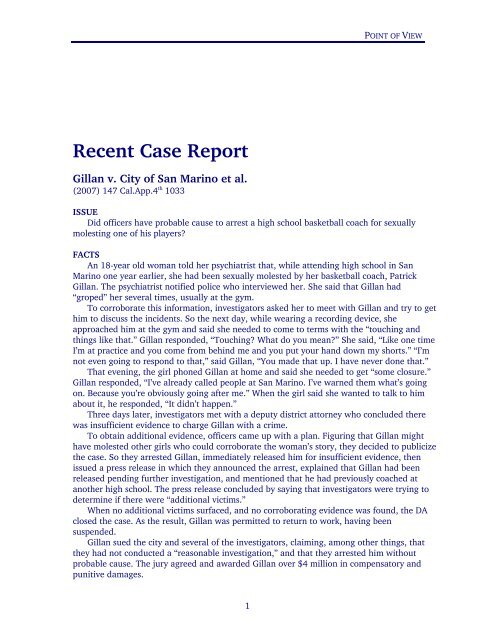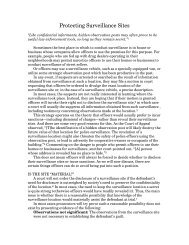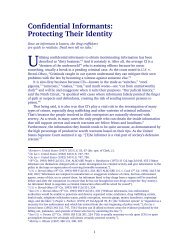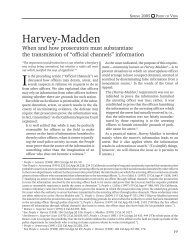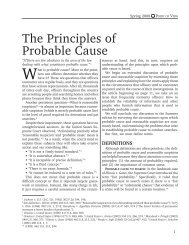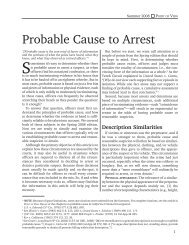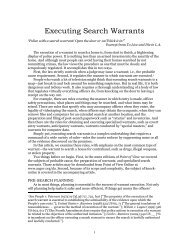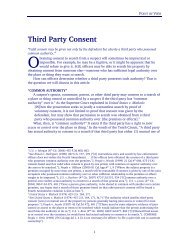Gillan v. City of San Marino - Alameda County District Attorney's Office
Gillan v. City of San Marino - Alameda County District Attorney's Office
Gillan v. City of San Marino - Alameda County District Attorney's Office
Create successful ePaper yourself
Turn your PDF publications into a flip-book with our unique Google optimized e-Paper software.
Recent Case Report<br />
<strong>Gillan</strong> v. <strong>City</strong> <strong>of</strong> <strong>San</strong> <strong>Marino</strong> et al.<br />
(2007) 147 Cal.App.4 th 1033<br />
1<br />
POINT OF VIEW<br />
ISSUE<br />
Did <strong>of</strong>ficers have probable cause to arrest a high school basketball coach for sexually<br />
molesting one <strong>of</strong> his players?<br />
FACTS<br />
An 18-year old woman told her psychiatrist that, while attending high school in <strong>San</strong><br />
<strong>Marino</strong> one year earlier, she had been sexually molested by her basketball coach, Patrick<br />
<strong>Gillan</strong>. The psychiatrist notified police who interviewed her. She said that <strong>Gillan</strong> had<br />
“groped” her several times, usually at the gym.<br />
To corroborate this information, investigators asked her to meet with <strong>Gillan</strong> and try to get<br />
him to discuss the incidents. So the next day, while wearing a recording device, she<br />
approached him at the gym and said she needed to come to terms with the “touching and<br />
things like that.” <strong>Gillan</strong> responded, “Touching? What do you mean?” She said, “Like one time<br />
I’m at practice and you come from behind me and you put your hand down my shorts.” “I’m<br />
not even going to respond to that,” said <strong>Gillan</strong>, “You made that up. I have never done that.”<br />
That evening, the girl phoned <strong>Gillan</strong> at home and said she needed to get “some closure.”<br />
<strong>Gillan</strong> responded, “I’ve already called people at <strong>San</strong> <strong>Marino</strong>. I’ve warned them what’s going<br />
on. Because you’re obviously going after me.” When the girl said she wanted to talk to him<br />
about it, he responded, “It didn’t happen.”<br />
Three days later, investigators met with a deputy district attorney who concluded there<br />
was insufficient evidence to charge <strong>Gillan</strong> with a crime.<br />
To obtain additional evidence, <strong>of</strong>ficers came up with a plan. Figuring that <strong>Gillan</strong> might<br />
have molested other girls who could corroborate the woman’s story, they decided to publicize<br />
the case. So they arrested <strong>Gillan</strong>, immediately released him for insufficient evidence, then<br />
issued a press release in which they announced the arrest, explained that <strong>Gillan</strong> had been<br />
released pending further investigation, and mentioned that he had previously coached at<br />
another high school. The press release concluded by saying that investigators were trying to<br />
determine if there were “additional victims.”<br />
When no additional victims surfaced, and no corroborating evidence was found, the DA<br />
closed the case. As the result, <strong>Gillan</strong> was permitted to return to work, having been<br />
suspended.<br />
<strong>Gillan</strong> sued the city and several <strong>of</strong> the investigators, claiming, among other things, that<br />
they had not conducted a “reasonable investigation,” and that they arrested him without<br />
probable cause. The jury agreed and awarded <strong>Gillan</strong> over $4 million in compensatory and<br />
punitive damages.
ALAMEDA COUNTY DISTRICT ATTORNEY’S OFFICE<br />
DISCUSSION<br />
The main issue on appeal was whether the <strong>of</strong>ficers had probable cause to arrest <strong>Gillan</strong>.<br />
Although there was no corroborating evidence, there would have been no need for it if the<br />
<strong>of</strong>ficers reasonably believed that <strong>Gillan</strong>’s accuser was reliable. This is because victims and<br />
other citizen informants are presumed to be reliable unless <strong>of</strong>ficers had reason to believe<br />
otherwise. As the California Supreme Court observed, “[I]t may be stated as a general<br />
proposition that private citizens who are witnesses to or victims <strong>of</strong> a criminal act, absent<br />
some circumstance that would cast doubt upon their information, should be considered<br />
reliable.” 1<br />
In determining whether there is reason to disbelieve an accuser, the courts will consider,<br />
among other things, whether she gave inconsistent statements, whether she was unable to<br />
provide specific and detailed information, and whether she had a motive to lie. In <strong>Gillan</strong>, all<br />
three <strong>of</strong> these circumstances virtually destroyed the accuser’s reliability.<br />
First, the court noted she had given <strong>of</strong>ficers inconsistent information about when, where,<br />
and how the incidents occurred. Second, on several occasions she said she was unable to<br />
provide details. As the court observed, “Some <strong>of</strong> the allegations were generalized and not<br />
specific as to time, date, or other details, including claims <strong>of</strong> touching in the gym. Other<br />
accusations concerning more specific events either lacked sufficient detail or were<br />
inconsistent in the details provided.” Third, the court pointed out that the accuser had a<br />
motive to lie, as she had expressed “strong antipathy toward <strong>Gillan</strong> based on his treatment <strong>of</strong><br />
her as a player on the basketball team.”<br />
Furthermore, the court noted that when the woman confronted <strong>Gillan</strong> at the gym, his<br />
responses to her allegations “did not suggest any consciousness <strong>of</strong> guilt or any attempt to<br />
silence the accuser, but only vehement denials and disbelief.”<br />
Consequently, the court ruled that the information known to the <strong>of</strong>ficers when they<br />
arrested <strong>Gillan</strong> was “not sufficiently consistent, specific, or reliable to cause a reasonable<br />
person to believe the accusation <strong>of</strong> sexual molestation.” 2 POV<br />
1 People v. Ramey (1976) 16 Cal.3d 263, 269.<br />
2 NOTES: (1) The court ruled that the <strong>of</strong>ficers were not entitled to immunity from liability for false<br />
arrest or false imprisonment because “[t]he decision to arrest <strong>Gillan</strong> was not a basic policy<br />
decision, but only an operational decision by the police purporting to apply the law.” Citing<br />
Government Code § 820.2. (2) The trial court had ruled that the <strong>of</strong>ficers “misused” Penal Code §<br />
849(b) by arresting <strong>Gillan</strong> “for purposes other than instituting a proper criminal complaint or<br />
charge—it was used as an investigative tool without a good faith belief there were sufficient<br />
grounds to file a complaint.” The Court <strong>of</strong> Appeal did not rule on this issue because the <strong>of</strong>ficers<br />
were immune from liability for “instituting or prosecuting any judicial or administrative<br />
proceeding within the scope <strong>of</strong> [their] employment,” even if they act “maliciously and without<br />
probable cause.” See Gov. C. § 821.6. (3) The court ordered a new trial on the issue <strong>of</strong><br />
compensatory damages.<br />
2


